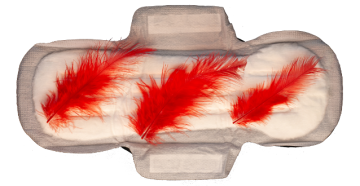What Causes Heavy Periods?


Are you one of those many facing unusually long or heavily bleeding periods? If yes, then you may be a victim of a medical condition known as menorrhagia.In this condition, the flow is so heavy that there is a need to change the tampon or pad almost every 2-3 hours. The cramps too can be pretty severe preventing you from your usual activities.
It may be difficult to identify if your period is normal, light, or heavy unless you talk with your doctor, and only a doctor can help you. Yes, a heavy bleeding period can be totally draining and can really hurt. But, then once you know the reasons for your heavy periods, it can take off the anxiety and offer some relief. We say, it surely helps!
What is heavy flow?

A heavy flow sometimes during your period is fairly common though the intensity varies. Many women normally have heavy flow days and cramps during their period A heavy bleeding period does not always have an underlying cause but may result from problems such as fibroids or endometriosis, so get on and make an appointment with your doctor for further clarification.
Reason for heavy periods

It’s essential to get the basics right – there is no one ideal level of menstrual bleeding! The intensity of periods varies which makes it difficult to identify a normal and an excessive bleeding period. However, if you require a new sanitary pad every couple of hours, and/or your menstrual cycle lasts longer than seven days, you may be dealing with menorrhagia.
Diagnosing the exact causes for heavy periods can sometimes be difficult. However, some physical conditions affecting the uterus, such as fibroids and polyps, may cause a heavy bleeding period. Generally, your menstrual flow is the heaviest on the first day or two of your periods, getting lighter on the other days.
Now, hormones are a great trigger in your menstrual cycle. The female progesterone and estrogen hormones determine how heavy your menstrual flow is. Changes in these hormone levels (especially for teenage girls), approaching menopause, and using certain birth control pills can lead to an abnormal or a heavy bleeding period.
A significant change in routine could also prompt abnormal or heavy bleeding periods. Try looking back at your pattern and then gauging your period may help explain the cause as well. In addition, drastic weight loss or gain, a rigorous exercise regime, a change in diet, or even stress can all trigger hormone changes that cause heavy periods.
How do I know if I have a heavy period?

It is not easy to define a heavy bleeding period as it varies from one woman to the other. But hey, on a generic level, most women lose less than 80ml blood during their period, and so a heavy bleeding period is defined as losing 80ml or more during each period or having periods that last longer than 7 days. Most women are quite aware of how much bleeding is normal for them. So, look out for signs for your period being significantly heavier than normal.
What are the symptoms of heavy periods?
Heavy period symptoms include menstrual blood flow that is heavier than usual and/or longer, like more than a week, intense cramps, fatigue, weak and out of breath. Oh, it can get dreary for the best of us. Also, the need to change your pad or tampon almost every hour is also a sign of a heavy period. So be watchful!
When to see a doctor?

Never delay seeing a doctor when you have extremely heavy periods that drain you out and prevent you from going about your daily activities. If you experience an abnormally heavy bleeding period, it could be a sign of menorrhagia and the best thing you could do is book an appointment with your doctor.
When you visit your doctor, go well prepared. Make sure you are completely aware of your dates and changing patterns, symptoms, etc. which will make it easy for the doctor to recommend a further course of action to get you relief from a heavy period.





